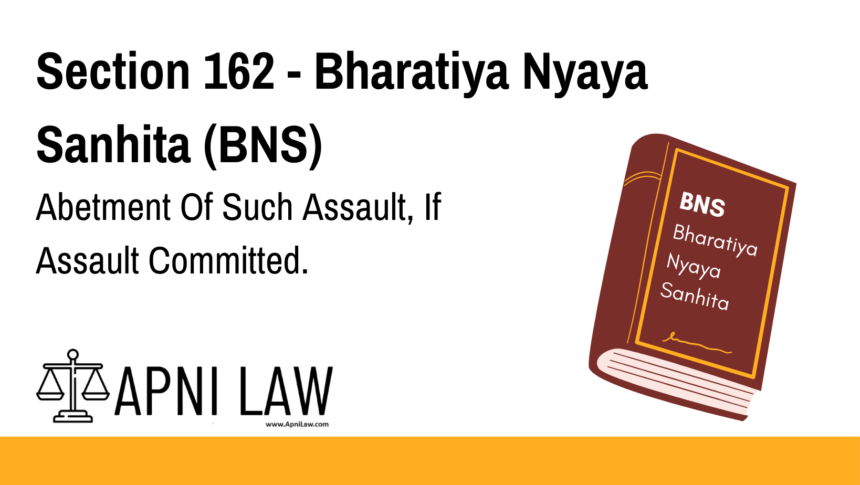Code: Section 162 BNS
Whoever abets an assault by an officer, soldier, sailor or airman, in the Army,
Navy or Air Force of the Government of India, on any superior officer being in the execution
of his office, shall, if such assault be committed in consequence of that abetment be punished
with imprisonment of either description for a term which may extend to seven years, and shall
also be liable to fine.
Explanation of Section 162 BNS
1. Understanding the Offense
This section deals with abetment of an assault on a superior officer by a soldier, sailor, or airman when the assault is actually committed as a result of such abetment.
Key elements of the offense:
- The accused must have instigated, aided, or encouraged the assault.
- The assault must have actually taken place in consequence of that abetment.
- The victim must be a superior officer performing official duties.
2. Difference Between Section 161 and 162 BNS
- Section 161 BNS: Punishes the abetment of an assault, whether or not the assault is committed. Punishment: Up to 3 years imprisonment + fine.
- Section 162 BNS: Applies only if the assault actually happens due to the abetment. Punishment: Up to 7 years imprisonment + fine.
3. Punishment Under Section 162 BNS
- Imprisonment up to seven years (either rigorous or simple).
- Fine, as determined by the court.
This section prescribes a harsher penalty than Section 161 BNS since the offense results in actual harm to a superior officer.
Illustration
Example 1: Civilian Instigating a Soldier to Attack a Superior Officer
A civilian encourages a soldier to physically assault his commanding officer, and the soldier carries out the attack. Since the assault took place due to the civilian’s abetment, the civilian will be punished under Section 162 BNS.
Example 2: Junior Officer Leading an Attack on a Senior Officer
A junior officer persuades several soldiers to attack a senior officer over grievances. If the soldiers actually assault the superior officer, the junior officer will be held liable under Section 162 BNS.
Common Questions and Answers on Section 162 BNS
1. What if the assault was not committed?
If the abetment occurred but the assault did not happen, Section 161 BNS applies instead. Section 162 BNS applies only if the assault is committed.
2. Can a civilian be punished under this section?
Yes, both civilians and military personnel can be prosecuted if they abet an assault on a superior officer.
3. Does the law require the assault to cause serious injury?
No, even a minor attack (e.g., pushing, slapping) is covered under this section.
4. Is verbal abuse covered under Section 162 BNS?
No, assault requires physical force or an attempt to use physical force. Verbal abuse is not covered under this section.
5. What if the superior officer was off-duty?
For the offense to be punishable under Section 162 BNS, the superior officer must be in the execution of his office (on duty) at the time of the assault.
Conclusion
Section 162 BNS ensures strict punishment for those who instigate violence against superior officers in the armed forces. By prescribing a higher punishment than Section 161 BNS, this law emphasizes the importance of military discipline and deterrence against attacks on superior officers.
For expert legal insights, visit ApniLaw today! 🚀











